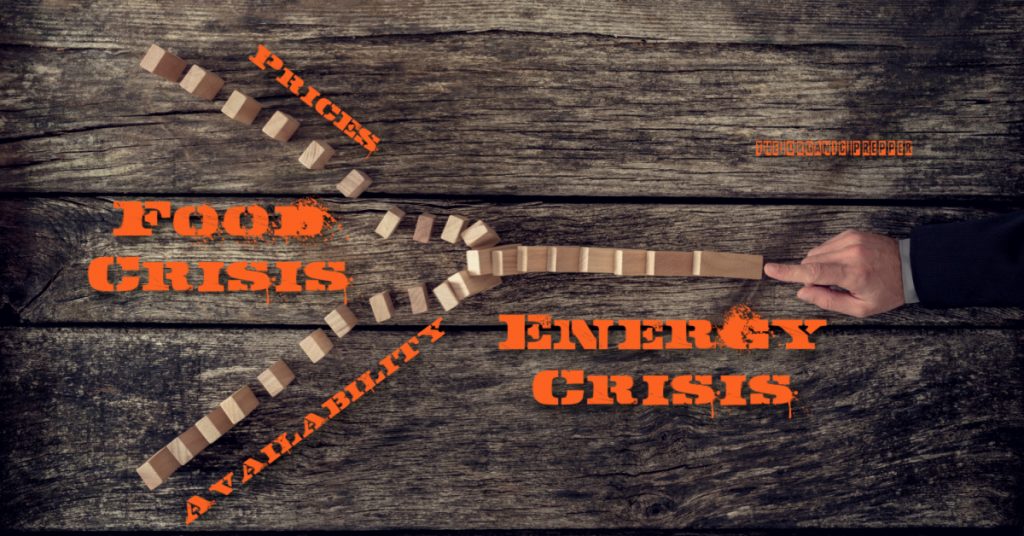by Daisy Luther, The Organic Prepper:

The cost of living is going nowhere but up. Everyone has been touched by skyrocketing inflation, high fuel prices, and the availability of certain supplies. And now, we’re facing a massive energy crisis. We’ve seen the signs for a while, as Fabian wrote last year in this article, but theory is quickly becoming reality.
Energy prices in Europe have catapulted to dizzying heights, leaving some folks facing bills of up to $10,000. And the United States is not untouched. Prices for power are already escalating here. Anecdotally, my own utility bill for September was double the price of my bill for August, and I used less energy. This upward trend is growing more common if my inbox is any indication.
TRUTH LIVES on at https://sgtreport.tv/
But it isn’t just the price of essential utilities like heating and cooking that are going to be affected. The price and availability of food will be affected as well. We’re about to get handed a food crisis.
Manufacturers can’t afford to produce food.
All over the world, manufacturers are shutting down production to combat the price of energy. And in a world already seeing food shortages and empty shelves, this is a massive hit.
A source in Sweden tells me that two large greenhouses have said they’re shutting down production for the winter due to energy prices. And while I don’t have links for Sweden specifically, Reuters reports that other manufacturers in Europe are also doing this.
Across northern and western Europe, vegetable producers are contemplating halting their activities because of the financial hit from Europe’s energy crisis, further threatening food supplies…

Surging power and gas prices will impact crops grown through the winter in heated greenhouses, such as tomatoes, peppers, and cucumbers, and those which need to be placed in cold storage, such as apples, onions, and endives…
European farmers are warning of shortages. The anticipated hit to production and jump in prices means supermarkets may switch to sourcing more goods from warmer countries such as Morocco, Turkey, Tunisia, and Egypt.
Surging gas prices are the biggest cost vegetable farmers cultivating inside greenhouses face, farmers said. Meanwhile, two French farmers renewing their electricity contracts for 2023 said they were being quoted prices more than ten times those of 2021. (source)
A major supplier of canned goods and other preserved food in the Netherlands, HAK, has announced they’re shutting down production during the coldest part of the year due to energy costs.
HAK, a major seller of conserved foods such as peas, beans, and apple sauce in the Netherlands, is to temporarily halt production this winter due to high energy costs, with a spokesperson saying the pause would last six weeks from January.
According to Dutch Chamber of Commerce records, HAK and related companies had sales of 100.2 million euros ($98 million) and operating profit of 10.2 million euros in 2021.
“If companies have to sell under their cost price for months on end, then things will turn out badly,” NOS further quoted Hoogeboom as saying.
Earlier on Monday, the Union of Dutch Fruit and Vegetable Processors (VIGEF) called for the government to either impose a cap on gas prices, as Germany has done or offer support for companies.
“It’s of importance to do this in line with other countries around us, to guarantee the continued existence of this industry and its supply chain, and to ensure that healthy food from Dutch soil remains affordable and available,” VIGEF said.
Food packed in cans and jars is usually heated to help reduce the need for artificial preservatives.
In addition, VIGEF estimated that the cost of metal and glass used in such packaging has risen to 25-35% of its members’ costs, from 5%, while farmers are also struggling with higher fertilizer prices, among other rising costs.
“It is not possible to keep absorbing these costs,” VIGEF said. (source)
HAK spokespeople assured the public this wouldn’t lead to empty shelves. (Of course not.)
(Check out our free QUICKSTART Guide to building a 3-layer food storage system to learn how to give yourself a buffer against rising food prices.)
Read More @ TheOrganicPrepper.ca



